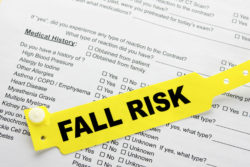Top Class Actions’s website and social media posts use affiliate links. If you make a purchase using such links, we may receive a commission, but it will not result in any additional charges to you. Please review our Affiliate Link Disclosure for more information.

Over 18 months, researchers studied approximately 28,000 patients in 16 different hospital units to determine if using alarms decreased the number of falls. The answer is no. At least not as a “sole prevention strategy,” according to Ausmed, an Australian professional development organization for medical professionals.
Bed alarms, which alert staff when a patient attempts to get out of bed on their own, are expensive. Scientists in this study wanted to determine if the pricey devices could be justified by a reduction in falls in facilities that used them.
Study Parameters
Researchers randomly assigned bed alarms to participating hospital units, while others were used as control groups without any alarms. All of the units also had other fall prevention strategies in place. In addition to beds, the alarms were placed on toilets or chairs, according to Ausmed, and would alert nursing staff “if a patient attempted to get up, shifting their weight off the sensor.”
Patients and study personnel were not told if they were in a unit using alarms.
Conclusions
The results painted an interesting picture. In nursing units where bed alarms were encouraged, the staff used them nearly 36 times more often. However, using the alarms more often did not translate to a decrease in the use of physical restraints, which are defined by the Journal of Medical Ethics as “any device, material or equipment attached to or near a person’s body and which cannot be controlled or easily removed by the person and which deliberately prevents or is deliberately intended to prevent a person’s free body movement to a position of choice and/or a person’s normal access to their body.”
Additionally, the number and rate of falls did not decrease in units where bed alarm use was encouraged, according to Ausmed, suggesting that relying on bed alarms “as a sole prevention strategy is not sufficient to decrease the risk of falls.”
History of Alarms and Falls in Nursing Homes
There are three very basic types of alarms: Mattress pad alarms, infrared alarms, and string alarms. Mattress pad alarms respond to changes in weight and pressure, while the infrared type will sound when the infrared light plane is broken, such as when a person tries to get out of bed. The string alarm is clipped to the patient and when the string connection is broken, the alarm goes off.
The Associated Press reported in 2016 that alarms first went into widespread use in the 1990s, about the same time the use of physical restraints was banned. But as indicated by the AP, “a growing body of evidence indicates alarms and other measures, such as fall mats and lowered beds, do little to prevent falls and can instead contribute to falls by startling residents, creating an uneven floor surface and instilling complacency in staff.”
Are There Situations When Bed Alarms May Be Helpful?
There are a variety of alarm types and a multitude of situations where they might be useful. According to VeryWellHealth.com, using an alarm when caring for an elderly family member with dementia at home could prevent help mitigate certain risks. Dementia patients have a tendency to wander and have generally poor judgment and understanding about their physical capacities, and may need help with basic care such as going to the bathroom.
In general, nursing home neglect lawsuits are filed individually by each plaintiff and are not class actions.
Do YOU have a legal claim? Fill out the form on this page now for a free, immediate, and confidential case evaluation. The attorneys who work with Top Class Actions will contact you if you qualify to let you know if an individual nursing home neglect lawsuit or class action lawsuit is best for you. Hurry — statutes of limitations may apply.
ATTORNEY ADVERTISING
Top Class Actions is a Proud Member of the American Bar Association
LEGAL INFORMATION IS NOT LEGAL ADVICE
Top Class Actions Legal Statement
©2008 – 2024 Top Class Actions® LLC
Various Trademarks held by their respective owners
This website is not intended for viewing or usage by European Union citizens.
Get Help – It’s Free
Join a Free Nursing Home Neglect Class Action Lawsuit Investigation
If you qualify, a nursing home lawyer will contact you to discuss the details of your potential case at no charge to you.
PLEASE NOTE: If you want to participate in this investigation, it is imperative that you reply to the law firm if they call or email you. Failing to do so may result in you not getting signed up as a client or getting you dropped as a client.
Oops! We could not locate your form.












